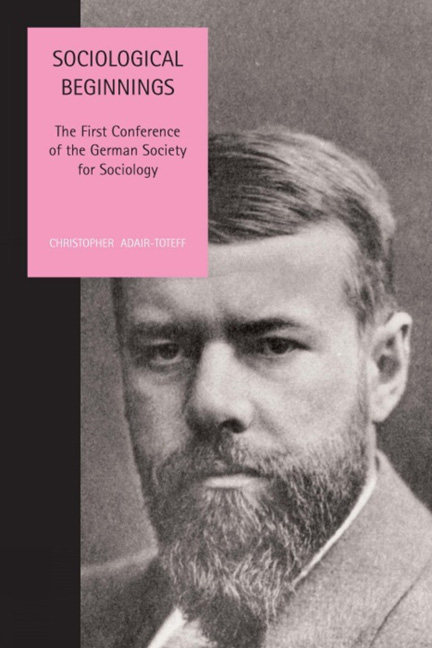Book contents
- Frontmatter
- Dedication
- Contents
- Preface
- A Note on Translation
- Chronology
- Short Biographies of the Main Participants
- Introduction
- The Papers of the First DGS Conference
- Georg Simmel – Sociology of Society
- Ferdinand Tönnies – Ways and Goals of Sociology
- Max Weber – Business Report followed by The Comparative Sociology of Newspapers and Associations
- Werner Sombart – Technology and Culture
- Ernst Troeltsch – Stoic–Christian Natural Law and Modern Profane Natural Law
- Select Bibliography
- Index
Georg Simmel – Sociology of Society
from The Papers of the First DGS Conference
- Frontmatter
- Dedication
- Contents
- Preface
- A Note on Translation
- Chronology
- Short Biographies of the Main Participants
- Introduction
- The Papers of the First DGS Conference
- Georg Simmel – Sociology of Society
- Ferdinand Tönnies – Ways and Goals of Sociology
- Max Weber – Business Report followed by The Comparative Sociology of Newspapers and Associations
- Werner Sombart – Technology and Culture
- Ernst Troeltsch – Stoic–Christian Natural Law and Modern Profane Natural Law
- Select Bibliography
- Index
Summary
[Wednesday Evening, 19 October 1910
At the invitation of the Frankfurt Academy for Social and Trade Sciences,
Professor Dr Georg Simmel, Berlin, gave the following lecture on ‘Sociology
of Society’ at the Greeting Evening, Wednesday 19 October.]
In the old argument about the essence of society, there is the view that there is a mystic significance in the idea that all human life drinks first and equally with reality; and there is the view that the essence of society should be only an abstract concept that the observer of the reality of the single existence can grasp afterwards, much as trees and streams, houses and fields are perceived as ‘a landscape’. The Society must concede that in fact this argument has a double meaning. On the one hand, in their immediate sensory existences as carriers of the socializing process, individuals join together to become the higher unity that is called ‘a society’. On the other hand, there are the interests that motivate living individuals to come together – economic and ideal interests, combative and erotic, religious and ‘caritative’ (sic). In order to satisfy such drives, in order to achieve such goals, the immense, manifold forms of social life grow. They all grow with one another, for one another, in one another, against one another, and through one another, in state and community, in church and economic union, in family and associations. Just as energy effects appear from material elements to bring the material into form, so that from innumerable ‘things’ there are human impulses and interests that move us and force us towards others in the forms of unification. Thus, we go from a mere number of co–existing beings to the enduring essence that is a ‘society’.
Within this process, or outside it, there now develops a particular sociological form corresponding to art and play, which draws its form out and leaves its reality behind. It remains here, if the concept of the drive to play or the drive to art possesses a real explanatory value; in any case, it indicates that each single game or artistic activity contains a non–effected universal, which differs from it in content or form.
- Type
- Chapter
- Information
- Sociological BeginningsThe First Conference of the German Society for Sociology, pp. 45 - 56Publisher: Liverpool University PressPrint publication year: 2005



